The number of corporate-backed funding deals dropped by 13% year on year in May 2022, the first clear sign that the pullback in the public markets is starting to have an impact.
Deals from around the world stood at 338 in May, down from 388 in the same month last year.
Investment value stood at $11.5bn in total estimated capital – down 45% from $20.75bn in May 2021. The US came first in the number of corporate-backed deals, hosting 136 rounds, while Japan was second with 44 and India third with 20.
Public markets have been jittery for some time about the possibility of a recession and our data shows the corporate venturing arena seems to be catching up with this narrative. The fear narrative was given a boost in the last week of the month when JP Morgan Chase’s CEO Jamie Dimon warned that an economic hurricane may be coming, and legendary entrepreneur Elon Musk shared his “bad feeling about the economy” on Twitter.
Monetary tightening, geopolitical instability and inflation rearing its ugly head are likely to have an impact on corporate investors. Even if we assume traditional VC firms and corporates are relatively well capitalised from exits reaped in the past two years, they will both likely transition to a relatively cautious mode in a changing environment for some time.
Exits are also down significantly. GCV Analytics tracked 15 exits involving corporate venturers as either acquirers or exiting investors in May, down from 58 in May 2021. Exited capital dropped from $20.73bn a year ago to $643m.
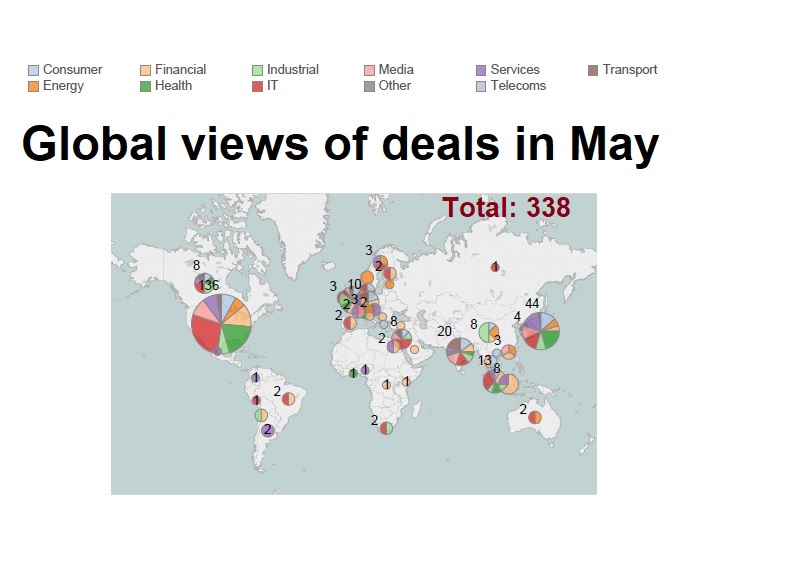
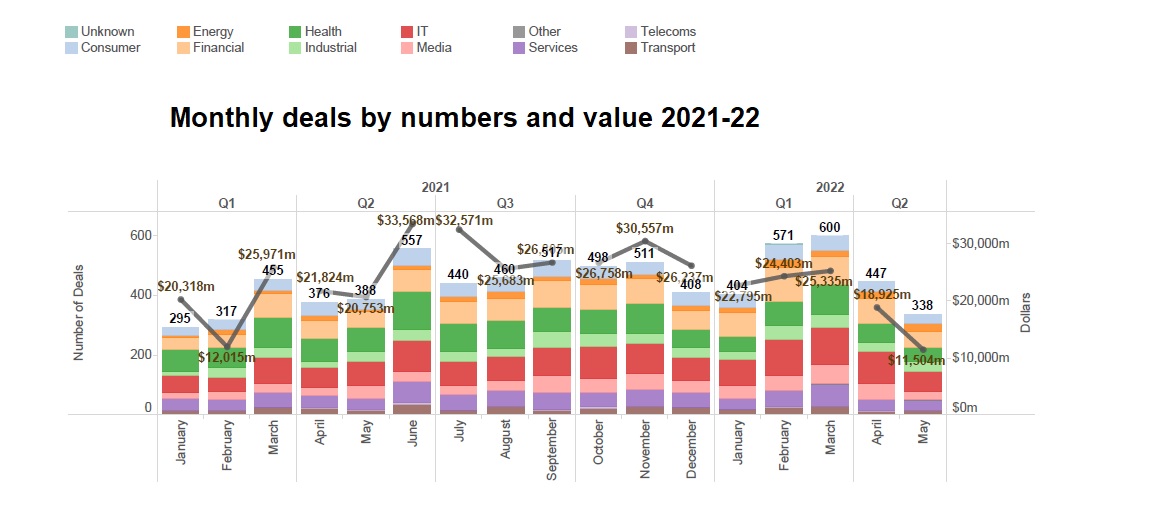
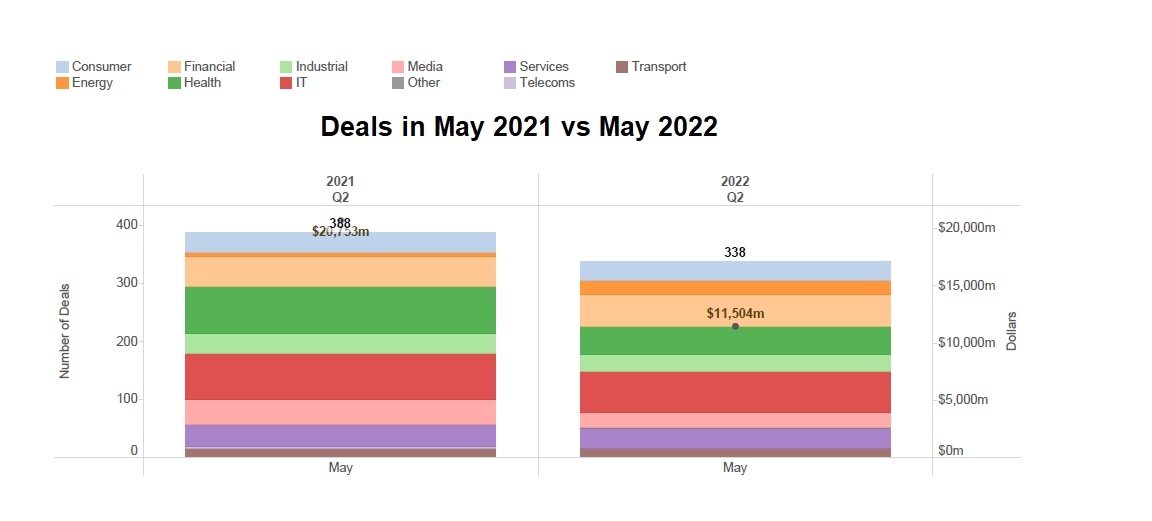
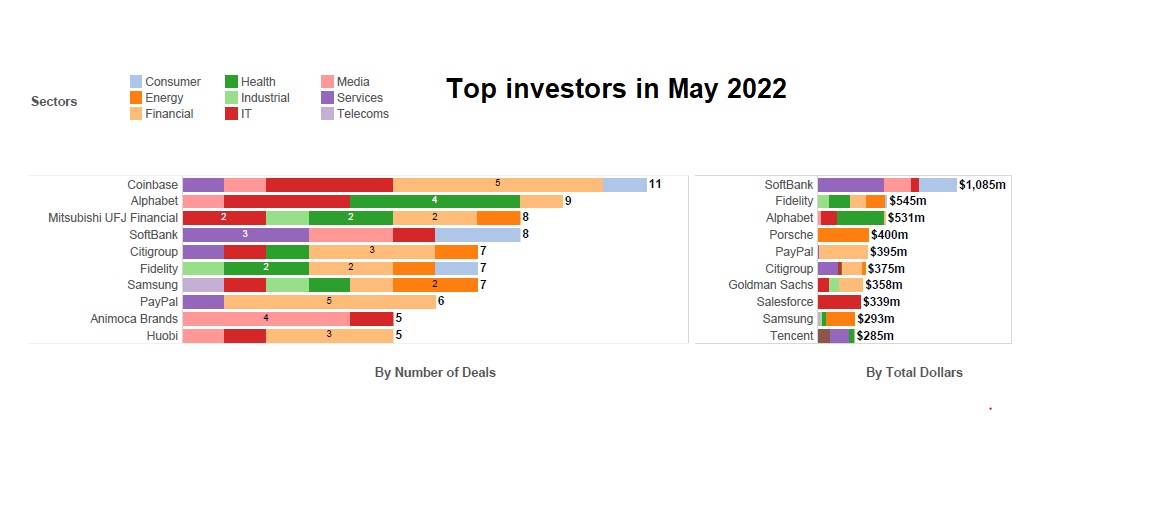
The leading corporate investors by number of deals were crypto asset exchange Coinbase, internet conglomerate Alphabet, telecoms and internet conglomerate SoftBank and financial firm Mitsubishi UFJ Financial. In terms of involvement in the largest deals, SoftBank, Alphabet and financial services and investment group Fidelity were on the top of the list.
GCV reported 63 corporate-backed funding initiatives including VC funds, new corporate venturing units, incubators and accelerators. This figure was three times bigger than the one from May 2021, which had registered 21 such initiatives. The estimated capital, however, stood at $9.1bn, not comparable with the $31.9bn from the same month last year.
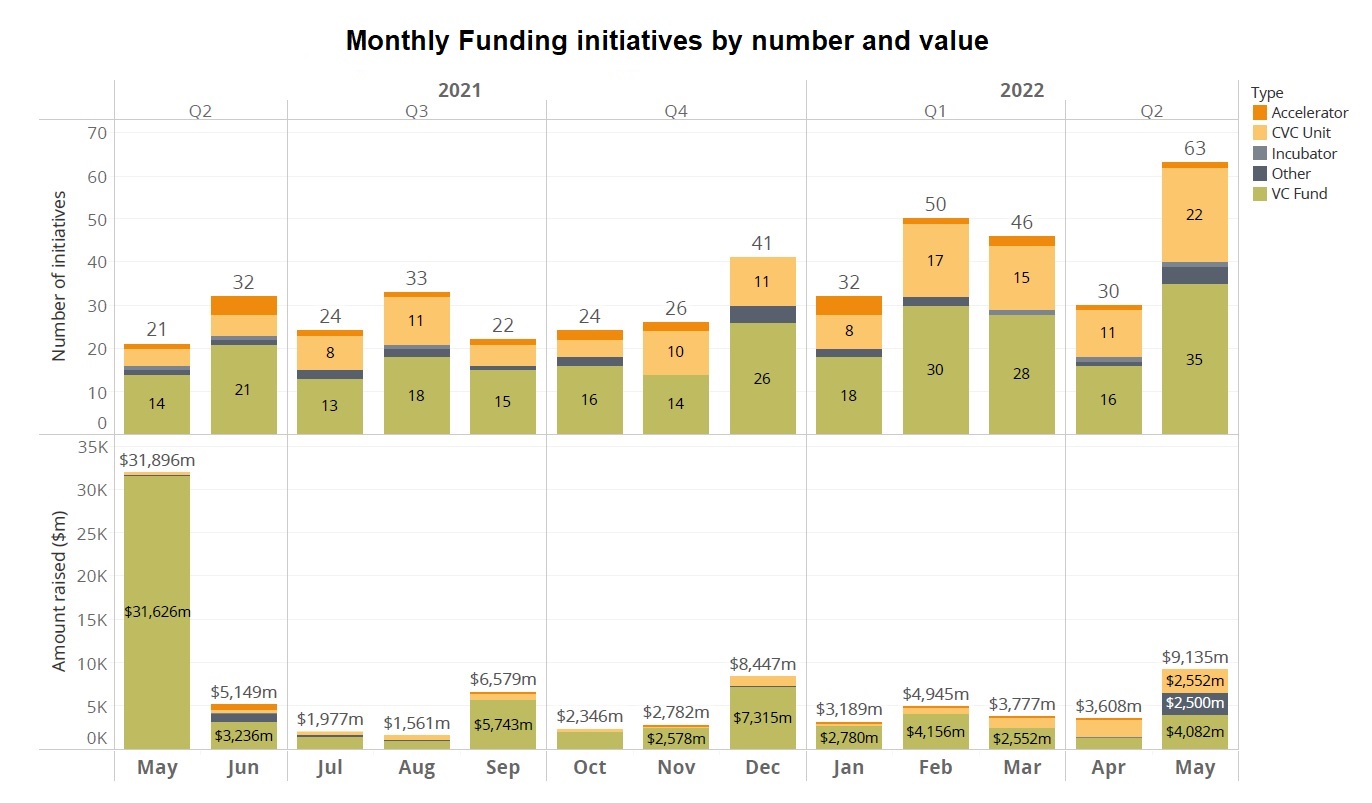
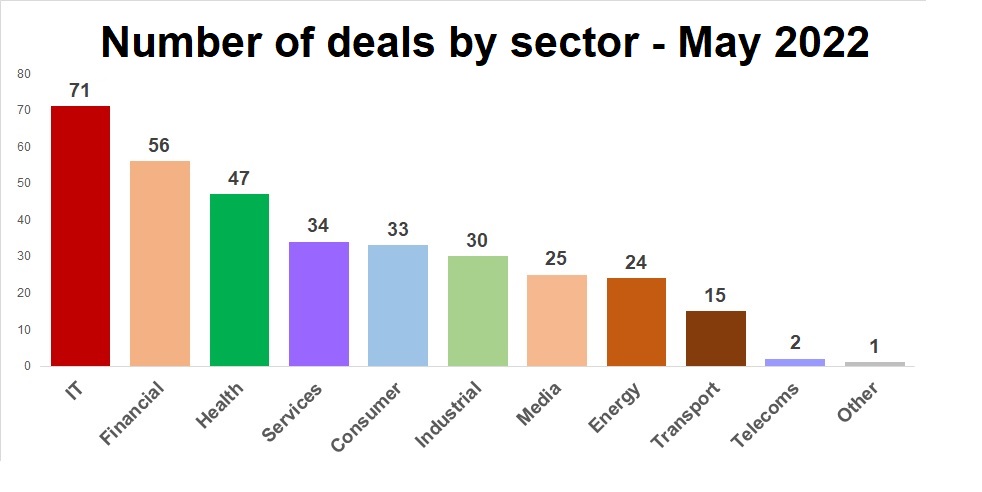
Deals
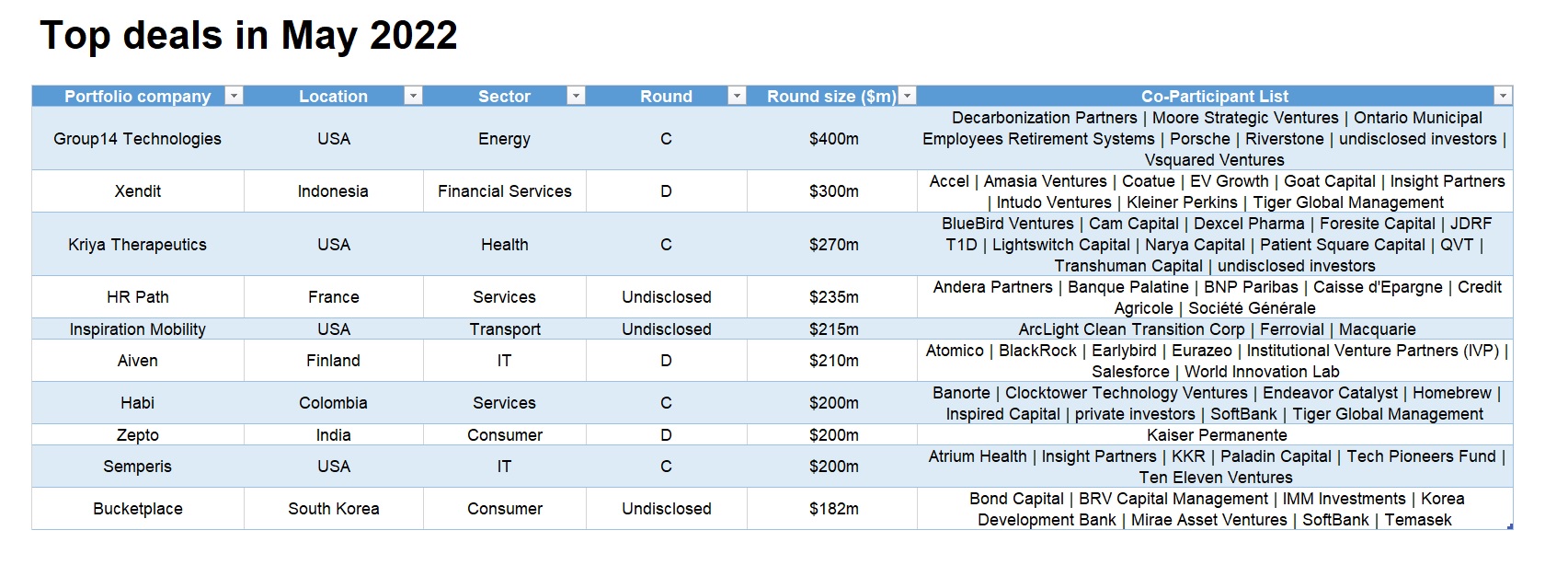
Emerging businesses from the IT, financial and health sectors led in raising the largest number of rounds in May. The most active corporate venturers came from the financial, IT, media and services sectors, as shown on the heatmap.
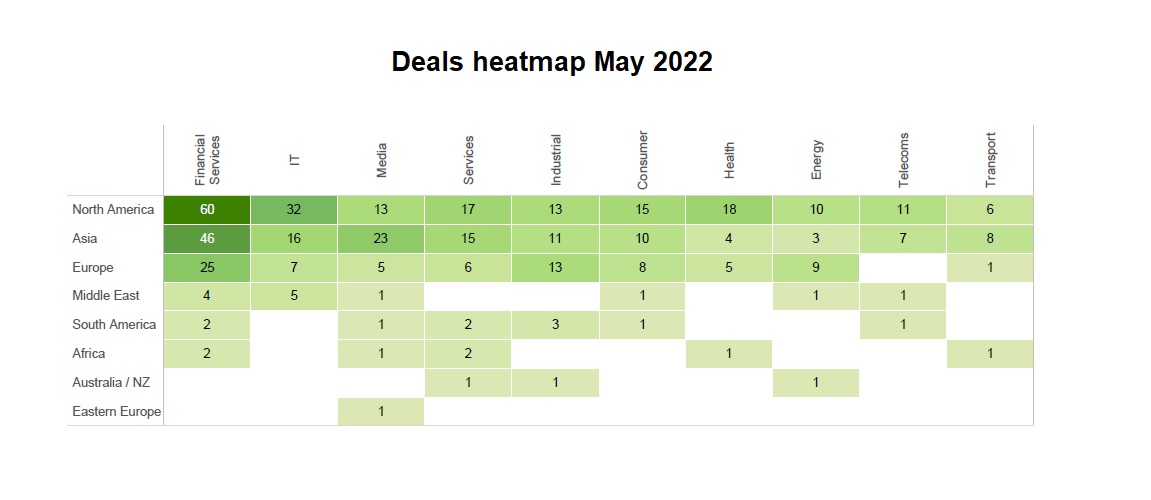
Carmaker Porsche provided $100m to lead a $400m series C round for Group14, the US-based developer of a silicon-carbon system for use in lithium-silicon batteries. The round included Ontario Municipal Employees Retirement System, Decarbonization Partners, Riverstone, Vsquared Ventures and Moore Strategic Ventures as well as unnamed other institutional investors. Founded in 2015, Group14 is building a silicon-carbon powder system designed to substitute or improve graphite anodes that are widely used in EV batteries. It also aims to electrify other sectors across the medical, consumer and commercial fields. Group14’s SCC55 material enables batteries to store 50% more energy when compared with conventional graphite anodes, according to the company.
Pharmaceutical firm Dexcel Pharma took part in US-based gene therapy developer Kriya Therapeutics’s $270m series C round. Patient Square Capital led the round, which included Bluebird Ventures, CAM Capital, Dexcel Pharma, Foresite Capital, JDRF T1D Fund, Lightswitch Capital, Narya Capital, QVT, Transhuman Capital and undisclosed others. Founded in 2019, Kriya is working on a fully integrated platform designed to reduce the time it takes a gene therapy to get to market and the cost per dose. The company initially focused on type 1 and type 2 diabetes as well as severe obesity, but has built a diversified pipeline of assets, covering rare and prevalent metabolic, ophthalmic and oncologic diseases.
Financial services firms Société Générale, BNP Paribas, Crédit Agricole Ile de France, Banque Palatine, LCL and Caisse d’Épargne Ile de France were among the investors in a €225m ($235m) round for HR Path, a France-based provider of human resources (HR) digital transformation technology. The round was led by Andera Partners and also backed by Société Générale Capital Partenaires. Founded in 2011, HR Path provides human capital management services dedicated to supporting businesses in the digital transformation of their HR departmenrs. The company engages in systems, applications and product ecosystem and focuses on designing, delivery, knowledge transfer and support for critical skills needed to make projects successful.
Transport infrastructure group Ferrovial took part in a $215m round for US-based mobility electrification technology developer Inspiration Mobility. ArcLight Capital Partners led the round, which included Macquarie Asset Management and which increased the company’s total funding to $415m. Founded in 2021, Inspiration Mobility provides financing, leasing and charging infrastructure services intended to serve companies looking to electrify and decarbonise their commercial fleet vehicles. It offers light and medium-duty fleet operators with the vehicle and charging services.
Salesforce Ventures, the corporate VC arm of enterprise software producer Salesforce, took part in a $210m series D round for Finland-based open source and cloud infrastructure software provider Aiven at a $3bn pre-money valuation. Eurazeo led the round, which included BlackRock and existing investors IVP, Atomico, Earlybird and World Innovation Lab. Founded in 2016, Aiven has developed an open-source cloud database software designed to serve all database needs, leveraging the power of logs, metrics, and dataflow or replication integrations required for hosting and managing open-source database and messaging systems.
SoftBank’s Latin America Fund joined early-stage fund Homebrew to co-lead a $200m series C round for Colombia-based residential property marketplace Habi, investing with financial services firms Banco Mercantil del Norte and Grupo Financiero Banorte as well as Tiger Global, Inspired Capital, Clocktower Technology Ventures, Endeavor Catalyst and Henry Kravis. Founded in 2019, Habi has developed an online real estate platform intended to simplify the process of buying and selling residential properties for middle-class consumers. It reduces sales time, mitigates the risks facing sellers in traditional transactions and eliminates the need for intermediaries.
Zepto, the India-based operator of a 10-minute grocery delivery service, reached a valuation close to $900m in a $200m series D round featuring healthcare provider Kaiser Permanente. The round was led by Y Combinator’s Continuity Fund and included Nexus Venture Partners, Contrary Capital, Glade Brook Capital and Lachy Groom. Zepto has grown into a serious competitor in India’s bustling fast delivery market since it came out of stealth mode in 2021, with a pledge to deliver essential groceries within 10 minutes from a network of micro warehouses dispersed throughout local neighbourhoods.
Healthcare provider Atrium Health’s Strategic Fund participated in a $200m series C round for Semperis, a US-based developer of enterprise identity confirmation technology. KKR led the round, which included Ten Eleven Ventures, Paladin Capital Group, Tech Pioneers Fund and returning backers including Insight Partners. Founded in 2013, Semperis has developed a cyber resilience and threat mitigation platform designed to ensure integrity and availability of critical enterprise directory services.
SoftBank subsidiary SoftBank Ventures Asia took part in a $182m round for South Korea-based interior design software producer Bucketplace. It was joined by Mirae Asset Capital, a vehicle for financial services provider Mirae Asset, as well as Temasek’s Vertex Growth fund, Bond Capital, BRV Capital Management, Korea Development Bank and IMM Investment. Bucketplace did not disclose its valuation but it reportedly doubled to roughly ₩2 trillion ($1.4bn) post-money. Founded in 2014, Bucketplace operates a mobile app dubbed Today’s House (Ohouse) that enables users to choose and execute home remodelling and renovation ideas, encompassing areas like furniture, decorations and interior structure.
Exits
GCV Analytics tracked 15 exits involving corporate venturers as either acquirers or exiting investors in May. They included 14 acquisitions and one initial public offering (IPO).
The exit count was significantly lower than the May 2021 figure (58). The total estimated exited capital stood at $643m, considerably smaller than the $20.73bn from same month last year. These figures continue to suggest that public and M&A market are no longer as buoyant as they were last year, which makes sense in light of inflation issues and interest rate hikes. The other possibility, of course, is that some relevant M&A deals may appear in the data subsequently due to the participants’ unwillingness to be vocal about them at the moment.
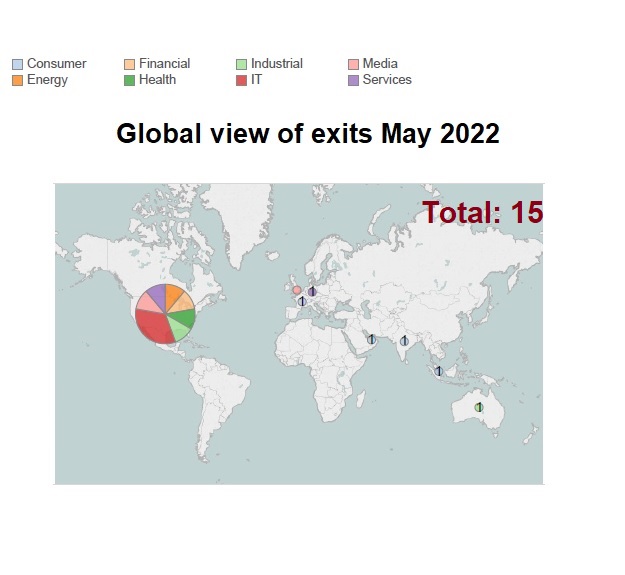
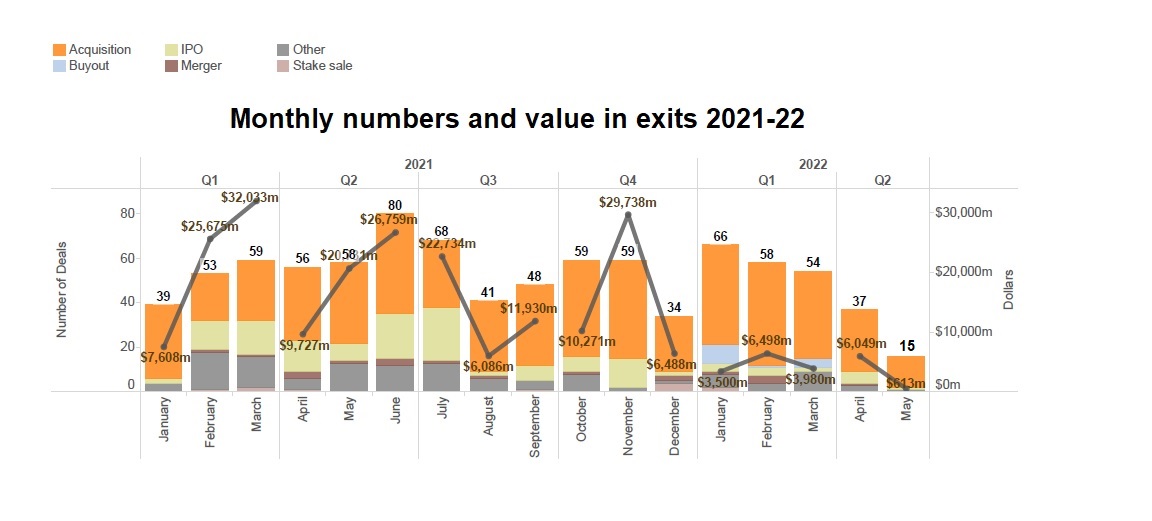
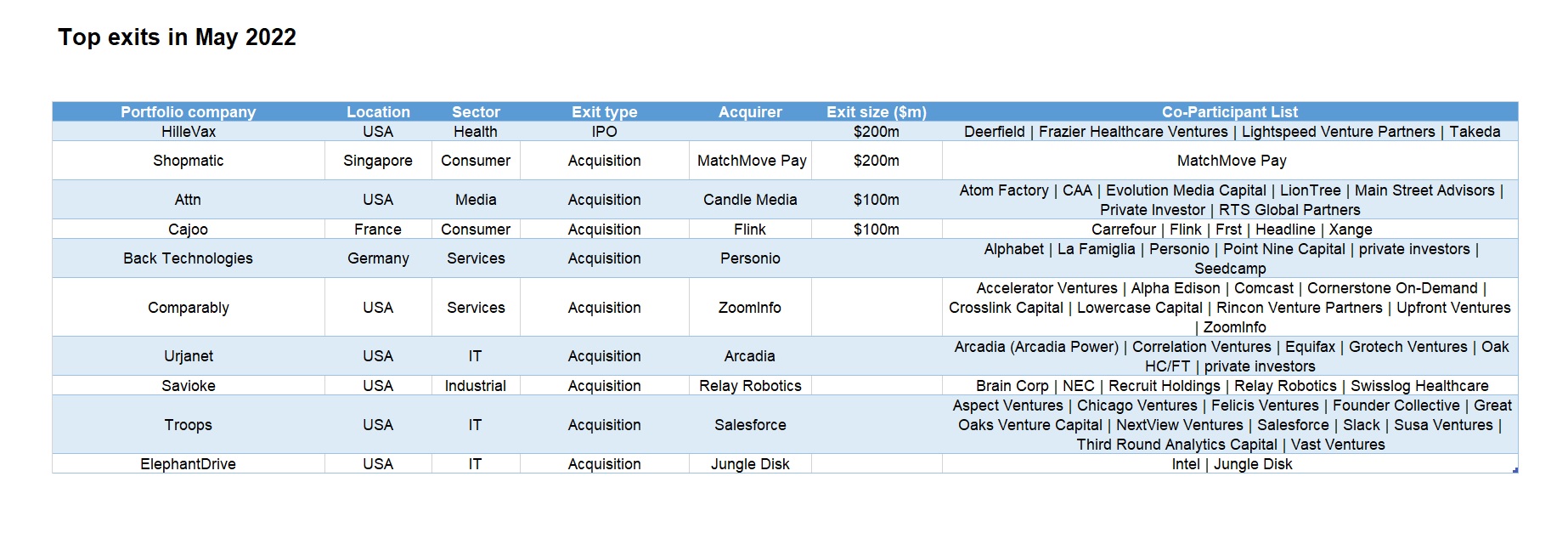
US-headquartered vaccine developer HilleVax floated on the Nasdaq Global Select Market in a $200m IPO enabling Takeda, the pharmaceutical firm from which it was spun off, to exit. The company increased the size of the offering from approximately 10.3 million shares to nearly 11.8 million shares and priced them at $17.00 each, in the middle of the IPO’s $16 to $18 range.
HilleVax was founded by the late Tadataka Yamada, formerly chief medical and scientific officer for Takeda. Its lead product candidate is a norovirus vaccine candidate known as HIL-214 which has already undergone nine clinical trials while under development by Takeda subsidiary Takeda Vaccines. The company will channel $125m of the IPO proceeds into clinical development of HIL-214, including a phase 2b trial which was initiated and related manufacturing activities.
Banking technology developer MatchMove paid $200m to acquire Singapore-based e-commerce platform operator and portfolio company Shopmatic. MatchMove had invested in the company in a 2020 round of undisclosed size that increased its overall funding to over $14m. Founded in 2014, Shopmatic runs an e-commerce platform that offering a range of services including organising a domain name, easy integrations with domestic and international payment gateways, finding shipping partners, product discovery through its Shopmatic World site, point-of-sale, inventory management and customer relationship management (CRM) tools.
Media group Candle Media paid $100m to acquire US-based digital content provider Attn, which is backed by talent agency CAA’s Evolution Media affiliate, in a cash and stock deal. Founded in 2014, Attn runs an online platform that publishes short-form videos with a progressive political slant. It is increasingly concentrating on premium series that can be shown by media partners such as ABC News and Facebook.
Online grocery ordering service Flink agreed to pay between €90m and €100m ($94.8m to $105m) for Cajoo, a France-based instant delivery service that had secured more than $40m in funding from investors including supermarket chain operator Carrefour. Founded in 2021, Cajoo has built a grocery delivery platform which delivers household goods such as pasta, shampoo, sweets, wine, beer and snacks, and gives receipt of goods within a short period.
Human resources software provider Personio paid an undisclosed amount to acquire Back Technologies, a Germany-based employee experience technology developer backed by Gradient Ventures, the artificial intelligence investment vehicle formed by Alphabet. The corporate took part in Personio’s $3.3m seed round in mid-2020 alongside La Famiglia, Point Nine Capital, Seedcamp and various angel investors.
Founded in 2018, Back Technologies runs a digital platform designed to handle employee service and digital workflows, offering integrations with knowledge management systems like Confluence and core HR systems like BambooHR and Personio in order to find related information and automate internal operations.
Mass media group Comcast and human resources software developer Cornerstone on Demand exited Comparably, the US-headquartered operator of an online employee review platform, through an acquisition of undisclosed size by market intelligence software provider ZoomInfo. Cornerstone on Demand and Comcast unit Comcast Ventures joined Crosslink Capital, Upfront Ventures, Lowercase Capital, Alpha Edison, Accelerator Ventures and Rincon Venture Partners in a $7.3m round in 2017 that took the company’s total funding past $13m. Founded in 2015, Comparably offers a data platform focusing on employee satisfaction and compensation, allowing individuals to see how their employers compare to others and enabling enterprises to review their own operations.
Climate technology provider Arcadia acquired Urjanet, the US-based utility data aggregator backed by credit score provider Equifax, for an undisclosed amount. The company had raised over $40m as of a $14.7m series D round in mid-2020 featuring Equifax, Oak HC/FT, Grotech Ventures, Correlation Ventures and Pete Kight. Urjanet has built a cloud-based software platform that aggregates data generated by utility, telecommunications and cable television providers across 47 countries to help businesses serve those sectors more effectively or support credit scoring and identity verification.
Savioke, a US-based service robot developer backed by medical product delivery service Swisslog Healthcare, robotics software producer Brain Corp, electronics manufacturer NEC and human resources firm Recruit, was acquired by a newly formed company called Relay Robotics that has been capitalised with $10m from unnamed investors through a recently closed series A round. All four corporates took part in a $13.4m series B round in 2018 that lifted the company’s overall funding to $31m. Founded in 2013, Savioke develops robotic couriers which handle internal deliveries in locations such as hotels and industrial plants. They recharge automatically and come with features such as supply chain tracking and the ability to interact with elevators in multi-storey buildings.
Salesforce agreed to pay an undisclosed amount to buy Troops.ai, a US-based, sales-focused data retrieval service backed by Slack Fund, a vehicle for Slack, the business communication app developer acquired by Salesforce in late 2020. Founded in 2015, Troops makes artificial intelligence-equipped software products for sales teams that allows CRM data from Salesforce to be integrated with Slack’s communication platform in order to facilitate automated updates on new sales and other operational developments.
Data recovery technology provider Jungle Disk acquired ElephantDrive, a US-based cloud storage software provider backed by chipmaker Intel. The corporate invested in the company through its Intel Capital unit in 2006 and 2007. Founded in 2005, ElephantDrive has developed a cloud backup, storage and data management platform designed for protecting and accessing data.
Note: Monthly data can fluctuate as additional data are reported after each issue of GCV magazine goes to press.
